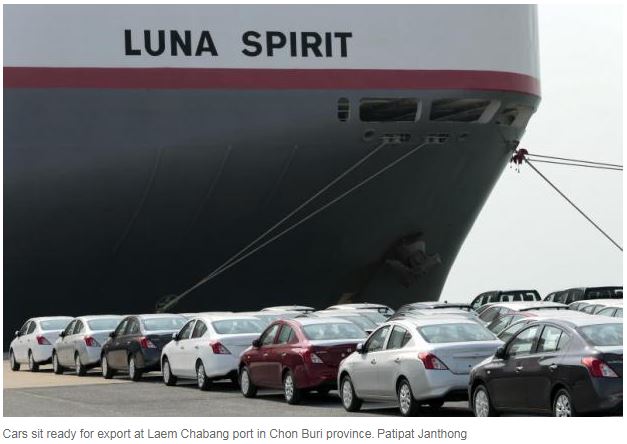Thailand: Shippers slash export forecast
The country’s largest shippers group has cut its export growth forecast to 3% this year from the previous 5%, citing the global economic slowdown, the Brexit impasse and the trade row between the world’s two biggest economies.
Ghanyapad Tantipipatpong, chairwoman of the Thai National Shippers’ Council, said that given mounting risk factors at home and abroad, export growth has no chance to reach 5% as earlier projected.
“We [Thailand] have to fetch at least US$22.8 billion a month to achieve 5% growth,” Ms Ghanyapad said. “That will be difficult, as the country is expected to generate only $21 billion a month at best now.”
According to the Commerce Ministry’s latest report, Thailand’s outbound shipments rose 5.9% year-on-year in February to $21.55 billion, but the increase was largely due to a one-time shipment of arms for military drills and the transport of oil-related products and gold.
Without oil-related products, gold and weaponry, exports would have contracted 4.9% from the same month last year, said Pimchanok Vonkorpon, director-general of the Trade Policy and Strategy Office.
Exports in baht terms rose by 5.5% in February from the same month last year to 678.50 billion baht.
On the import side, value in February fell by 10% year-on-year to copy7.5 billion, resulting in a trade surplus of $4.03 billion.
For the first two months of 2019, exports registered 0.16% growth from the same period last year.
The ministry has forecast export growth of 8% for this year after a 6.7% rise in 2018.
According to Ms Ghanyapad, a possible hike in the daily minimum wage is a key area of concern for exporters.
“If the new government raises the daily minimum wage to 400 baht a day as pledged, with no skill improvement for labourers, it will add risks to the country’s export prospects because this will raise production costs for local manufacturers and exporters,” she said.
Higher wages may prompt some private companies to relocate their factories to neighbouring countries, Ms Ghanyapad said.
The council is urging the next government to study carefully the pros and cons before making any decision to raise the minimum wage.
“The daily minimum wage should be raised on a gradual basis and linked with workers’ skills and the provinces they are in,” Ms Ghanyapad said.
Source: https://www.bangkokpost.com/business/news/1655600/shippers-slash-export-forecast


 Thailand
Thailand




